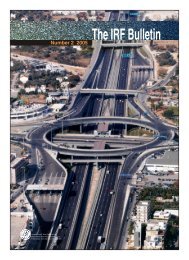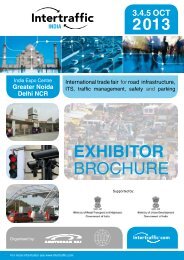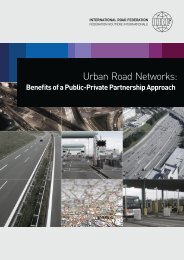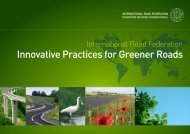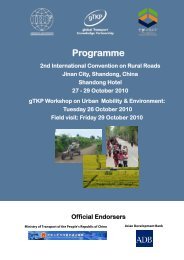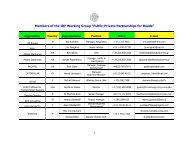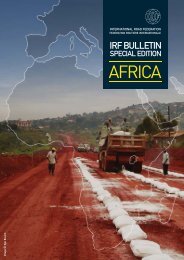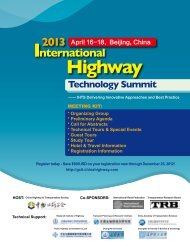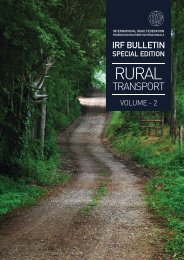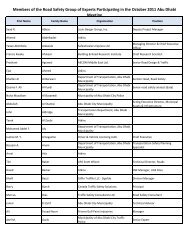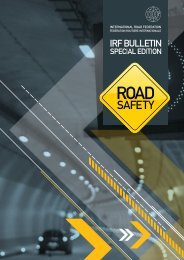Download - IRF | International Road Federation
Download - IRF | International Road Federation
Download - IRF | International Road Federation
You also want an ePaper? Increase the reach of your titles
YUMPU automatically turns print PDFs into web optimized ePapers that Google loves.
ROAD SAFETY<br />
others, GRSP's team is helping these countries build<br />
sustainable long-term capacity, based on their own<br />
cultural, political and economic circumstances.<br />
Signs of Progress: there are many signs of progress. A<br />
number of countries - especially those that were lacking<br />
legislation or road safety policy or action - are starting to<br />
pick up on the importance of the issue. Countries such as<br />
Lao PDR, Cambodia, Indonesia, Vietnam and Thailand<br />
have all enacted important road-safety legislation in<br />
recent years while GRSP is engaged with a wide range of<br />
players in a host of capacity-building activities around the<br />
region. Last year, for example, GRSP received a USD<br />
850,000 grant from the Japan Social Development Fund<br />
to enable a programme that encourages young people in<br />
north eastern Thailand to wear motorcycle helmets. The<br />
grant supports public awareness, subsidises helmets,<br />
helps enforcement and first aid training and allows local<br />
communities to set road safety priorities.<br />
In Cambodia, GRSP is working with Handicap<br />
<strong>International</strong> on various road-safety programmes,<br />
including helmet wearing compliance and development<br />
of helmet standards. Handicap <strong>International</strong> began<br />
working in the region to prevent casualties from land<br />
mines, but has since begun working to prevent road crash<br />
injuries. A similar partnership has begun in Lao PDR.<br />
Meanwhile, Malaysia, which began partnering with GRSP<br />
in 2007 is emerging as a road safety leader in the ASEAN<br />
region. The government has even elevated the <strong>Road</strong><br />
Safety Department to the director-general level, the<br />
second highest civil service rank.<br />
some seeds here, to raise public awareness and also to<br />
get more political commitment," she says.<br />
Around Asia, that awareness is clearly growing. There is a<br />
greater sophistication in the media on road safety issues,<br />
and a growing awareness of GRSP among transport<br />
agencies and local governments as the go-to experts. In<br />
countries such as Malaysia, there are signs that local<br />
officials are making GRSP strategies very much their own.<br />
Malaysia's national newspaper The Star, recently carried<br />
an exhortation to "traffic cops to be more gentle," and<br />
including words that were the focus of GRSP workshops<br />
in Malaysia, according to GRSP consultant Gayle Di Pietro;<br />
she says it's also exciting to see less-developed countries<br />
such as Cambodia engaging in partnerships to tackle<br />
tough issues such as helmet wearing, helmet standards,<br />
speed management and strategic traffic policing.<br />
GRSP has given police training sessions in Cambodia and<br />
research assistance to help identify problem areas. Di<br />
Pietro refers to "building their capacity - help them in<br />
building their ideas, in their context." Malaysian police<br />
officers who had earlier attended a GRSP pilot<br />
programme on professional development told Di Pietro<br />
that they felt valued, as a result. "They had some input<br />
into the way that they work. The professional<br />
development gave some recognition of the skills they<br />
knew they had."<br />
Despite progress, Asian countries have a long way to go.<br />
For example, the 2008 Beijing Olympics served as a visible<br />
reminder of China's growing place in the world economy.<br />
Developments for the Olympics led to several road and<br />
public transport improvements. But even GRSP<br />
programmes there are just the beginning of a long<br />
process. It has taken "safe" countries such as Sweden<br />
and Australia over 40 years to get to today's level. It is<br />
possible that China has to go through that process, as<br />
well. Ann Yuan, GRSI China (see first article in this<br />
section), who works with partners on a variety of<br />
initiatives, from drinking and driving, to speed<br />
management on China's highways, to intersection<br />
improvements in Beijing, refers to a "step-by-step"<br />
process. Each project starts with careful study, design,<br />
implementation, then re-assessment - and serves as a<br />
model for future endeavours. "We are trying to plant<br />
<strong>IRF</strong> BULLETIN SPECIAL EDITION : ASIA & OCEANIA<br />
18



